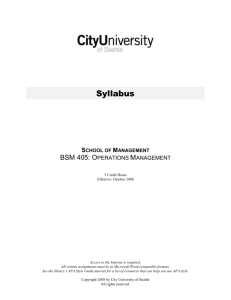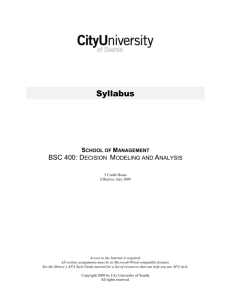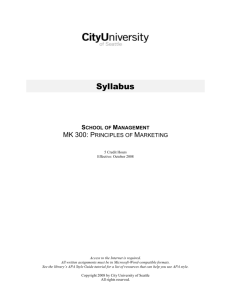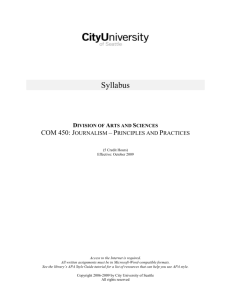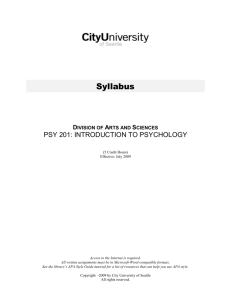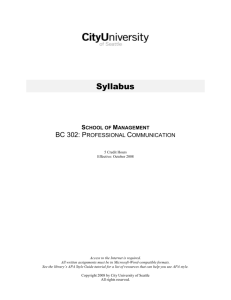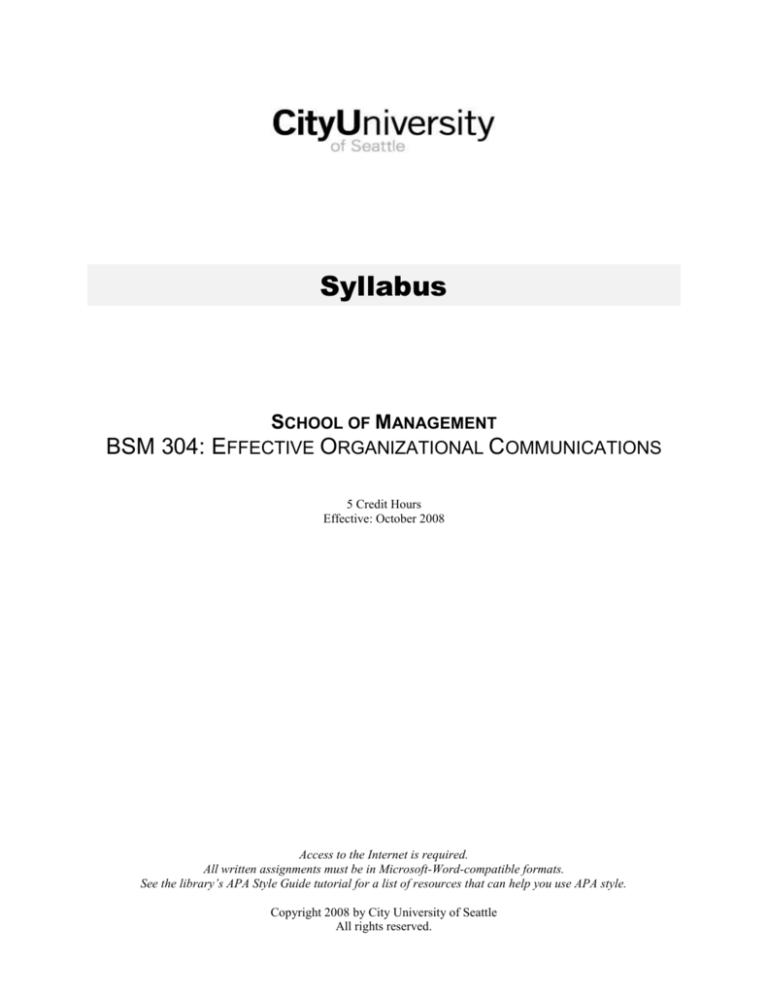
Syllabus
SCHOOL OF MANAGEMENT
BSM 304: EFFECTIVE ORGANIZATIONAL COMMUNICATIONS
5 Credit Hours
Effective: October 2008
Access to the Internet is required.
All written assignments must be in Microsoft-Word-compatible formats.
See the library’s APA Style Guide tutorial for a list of resources that can help you use APA style.
Copyright 2008 by City University of Seattle
All rights reserved.
BSM 304: EFFECTIVE ORGANIZATIONAL COMMUNICATIONS
FACULTY
Faculty Name:
Contact Information:
[Instructor may insert personal message if desired]
COURSE DESCRIPTION
This course covers internal and external communication in the contemporary evolving organization.
Students will assess their management communication style and identify areas for improvement. Topics
include interpersonal and small group dynamics, use of communications technology, motivation, conflict
resolution, and communicating with diverse audiences.
COURSE RESOURCES
Required and recommended resources to complete coursework and assignments are listed on the
My.CityU portal at Library>Resources by Course.
CITYU LEARNING GOALS
The content of this course addresses the following CityU Learning Goals:
Strong Communication and Interpersonal Skills;
Critical Thinking;
Diverse and Global Perspectives;
Lifelong Learning.
PROGRAM CONTEXT
The content of this course aligns with the following program outcomes:
Recommend improvements that align with the company’s strategy, goals, and culture;
Integrate foundational knowledge of business functions;
Access and evaluate relevant information to guide business decisions;
Deliver powerful presentations and produce examples of effective business writing for diverse
audiences.
COURSE OUTCOMES
In this course, learners…
Assess individual management communication style and identify areas for improvement;
Demonstrate the ability to participate effectively in interpersonal communication and small
group decision-making;
(BSM 304)
Page 2
Eff: 10/08
Plan, prepare, and deliver an effective group project, oral report, and slide presentation;
Demonstrate the ability to communicate effectively with diverse audiences;
Demonstrate the ability to utilize communication technologies;
Differentiate, apply, and appraise conflict resolution strategies;
Recognize, define, apply, and assess criteria for effective organizational communication.
CORE CONCEPTS, KNOWLEDGE, AND SKILLS
Criteria for effective organizational communication;
Interpersonal and group dynamics;
Preparing written and oral organizational communications;
Communicating with diverse audiences;
Communication technologies;
Conflict management;
OVERVIEW OF COURSE GRADING
The grade students receive for the course will be derived using City University of Seattle’s decimal
grading system, based on the following:
OVERVIEW OF REQUIRED ASSIGNMENTS
Percent of Final Grade
Management Communication Journal
Management Communication Assessment and Improvement Plan
Group Decision-Making Documents (i.e., agendas, records, and group
member evaluations)
Written Management Communication Project (i.e., conference plan,
announcement, invitation, agenda, and audience hand-outs)
Conference Oral Report with Slide Presentation and Notes
Individual Informational Blog
Role-Playing Assignments
Midterm and/or Final Examination
Instructor Determined Assignments (Including Discussion
Questions/Exercises as well as Participation)
TOTAL
5%
5%
5%
15%
15%
5%
10%
20%
20%
100%
SPECIFICS OF COURSE ASSIGNMENTS
Management Communication Journal
Throughout the course, you will keep a written record identifying criteria for effective organizational
communication, describing and assessing your individual management communication style with regard
to each of the criteria, explaining methods you will use to improve your style, and evaluating your efforts
to implement the methods for improvement.
Management Communication Assessment and Improvement Plan
(BSM 304)
Page 3
Eff: 10/08
Utilizing your Management Communication Journal, you will prepare a written assessment of your
overall management communication style, identifying areas for improvement and providing a
comprehensive plan to address and remedy each area in the future. The Management Communication
Assessment and Improvement Plan must be three to five pages in length.
Group Decision-Making Documents
Using an appropriate format, you will prepare and submit certain documents used by your group in
making decisions for planning and preparing your group’s management communication project. These
documents include all agendas, records, and group member evaluations of the group’s decision-making
process. Group records include, but are not limited to, the following: formal and informal meeting notes
(meetings may be held face-to-face, in group discussion boards, or by e-mail, telephone, text messaging,
etc.), telephone logs, proposals, letters, memos, and others.
Written Management Communication Project
Your group will submit a written management communication project which plans, organizes, and holds a
conference on an appropriate topic. The written documents in the project include a conference plan,
announcement, invitation, agenda, and audience hand-outs (2 or more).
Your group will investigate and select an appropriate topic for your conference. The group’s proposed
topic must be approved by the instructor. Possible conference topics include principles of business
interviewing, developing leadership through communication skills, holding effective problem-solving
meetings, improving negotiation skills, harnessing verbal aggressiveness at the office, inter-cultural
communication in the workplace, investigating communication in business organizations, and so forth.
Conference Oral Report with Slide Presentation and Notes
Your group will prepare an oral report and slide presentation with notes on an appropriate topic to be
presented at the group’s conference. Each group will have one-half hour to hold its conference on-site
during the course.
Individual Informational Blog
Using an appropriate format, you will prepare an informational blog on a topic in effective organizational
communication.
Role-Playing Assignments
You will dramatize certain criteria for effective organizational communication in role-playing
assignments. The dramatizations will address conflict resolution strategies in addition to other important
criteria for effective organizational communication. Examples of such criteria are active listening, nonverbal communication, and interviewing techniques.
Midterm/Final Examination
A written examination may be given near the middle and/or at the end of the course. The exams test your
understanding and ability to recognize, define, apply, and assess criteria for effective organizational
communication
(BSM 304)
Page 4
Eff: 10/08
Instructor Determined Assignments
Whether in class, online, or in a mixed mode setting, students will be graded on their participation in
classroom discussions; their ability to present, explain, or defend alternative viewpoints; and the degree to
which they have mastered the concepts and principles inherent in the study of professional
communication. Written work will be assessed not only on relevance to the subject presented, but also on
adherence to good written form and professional presentation.
COURSE POLICIES
[Instructor inserts course policies here, based on school and/or program guidelines.]
Late Assignments
Students are expected to meet submission requirements for assignments in a timely manner. Evaluation
includes an assessment of timeliness. Late assignments jeopardize your learning, and may also for your
classmates.
A 1%, per each day late, penalty will be assessed for all late work. All assignments MUST be turned in no
later than the last night of the course.
[Instructor may insert his or her policy on late assignments if desired]
Participation
Students are expected to be actively engaged in a discussion or other activities. Active engagement means
contributing substantive, thoughtful and reflective responses. If online, students must post their initial
responses during the first three days of the week, and their responses to other students’ postings during
the last four days of the week.
Professional Writing
All assignments for this course should be of professional quality. The writing should always take into
consideration the intended audience. Hand written work will not be accepted.
This course requires you to use the American Psychological Association (APA) style in preparing any
required research papers, or any written work where other sources are used. References should be cited
for all facts, ideas, conclusions, and opinions that are not your own.
A proper title page should preface all written assignments, unless otherwise stated. The title page should
include: your name, the title of the paper, the name and number of the course, your course start date, the
date submitted, and the name of the instructor.
Your work should be typed or word-processed on white 8 ½ by 11 inch paper. Any narrative sections
should be double-spaced. Some assignments may require that your work be prepared on a computer
spreadsheet.
UNIVERSITY POLICIES
(BSM 304)
Page 5
Eff: 10/08
You are responsible for understanding and adhering to all of City University of Seattle’s academic
policies. The most current versions of these policies can be found in the university catalog that is linked
from the CityU Web site.
Academic Integrity
Scholastic honesty in students requires the pursuit of scholarly activity that is free from fraud, deception
and unauthorized collaboration with other individuals. You are responsible for understanding CityU’s
policy on scholastic honesty and adhering to its standards in meeting all course requirements. A complete
copy of this policy can be found in the university catalog in the section titled Scholastic Honesty under
Student Rights & Responsibilities.
Attendance
Students are expected to attend both online and on-site each week. If a student is unable to attend either
the online and/or the on-site session, the student should notify the instructor prior to the session, or as
soon as possible after the session is missed. A missed class seriously hampers a student’s learning and
course participation. Make every effort to attend every session of the course.
SUPPORT SERVICES
Disability Resources
If you are a student with a disability and you require an accommodation, please contact the Disability
Resource Office as soon as possible. For additional information, please see the section in the university
catalog titled Students with Special Needs under Student Rights & Responsibilities.
Library Services
In order to help you succeed in this course, you have access to library services and resources 24 hours a
day, seven days a week. CityU librarians can help you formulate search strategies and locate materials
that are relevant to your coursework. For help, contact a CityU librarian through the Ask a Librarian
service. To find library resources, click on the Library link in the My.CityU portal.
SmartThinking
As a CityU student, you have access to 10 free hours of online tutoring, including writing support, from
certified tutors 24 hours a day, seven days a week. Contact CityU’s Student Support Center at
info@cityu.edu to request your user name and password.
(BSM 304)
Page 6
Eff: 10/08


